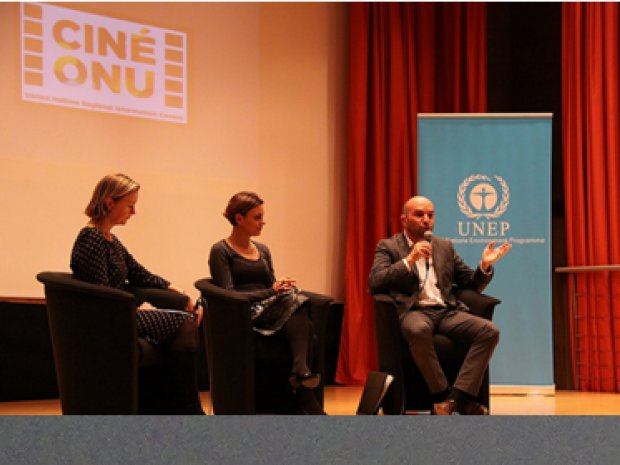Empowering Women through Solar Energy
Discussion details
On 18 November UNEP participated in Brussels in a panel discussion following the screening of Italian award winning documentary “Bring the Sun Home.”
The documentary, directed by Chiara Andrich and Giovanni Pellegrini, tells the story of Illiterate women from villages around the world with no electricity, who attend a course in India to learn how to install solar panels. Most of these women do not speak English but are determined to learn the technology. Those who completed the course have returned as solar engineers to their villages, and have brought power and light to more than 300,000 people.

|
Photo: UNRIC From left to right: Caroline Petit, Deputy Director United Nations Regional Information Centre (moderator), Antonella Santilli, Enel Green Power and Thierry Lucas, UNEP. |
The screening at the Italian Cultural Institute was opened by Lucia Gotti Venturat, Producer of the film, and followed by a lively Q & A with contributions from Antonella Santilli, Head of Sustainability of Enel Green Power, and Thierry Lucas, Coordinator of the Biodiversity and the Ecosystems Management Subprogramme, UNEP.
Antonella Santilli indicated that although the impact of the project on economic development is still being assessed, “on the field it is visible that the wealth and safety of the people is improving”. The Barefoot College in India, where the trainings were given to the women, is in fact thinking of starting training centers elsewhere in the world such as Africa or Latin America, she noted.
The overall message from the documentary was one of hope and positive action. The role of women was considered crucial in development. “Women are in charge of transmitting education, so change starts with them” stated Thierry Lucas after the documentary screening, and that working with women is at the core of the work of the UN.
Mr Lucas also explained UNEP’s en.lighten initiative, which was established to accelerate a global market transformation to environmentally sustainable, energy efficient lighting technologies, as well as to develop strategies to phase-out inefficient incandescent lamps to reduce CO2 emissions and the release of mercury from fossil fuel combustion.
“This documentary shows one of the many positive changes which are happening in the world. It is about being convinced that you can make it happen, and they will make it happen”. The COP 21 in Paris is also one of these changes, it is of urgency that we come up with a legally binding agreement added Thierry Lucas during the lively Q&A with the audience.
Log in with your EU Login account to post or comment on the platform.